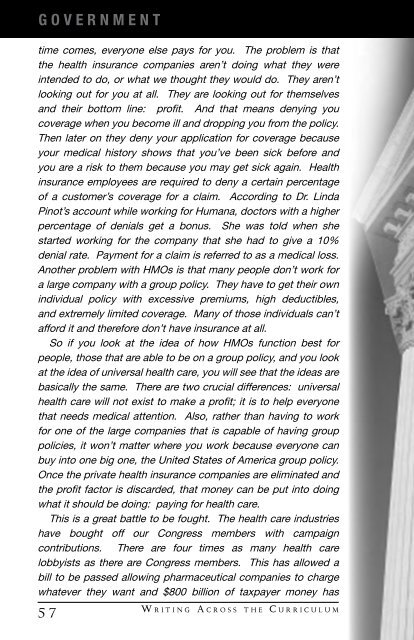2008 - Communication Across the Curriculum (CAC)
2008 - Communication Across the Curriculum (CAC)
2008 - Communication Across the Curriculum (CAC)
Create successful ePaper yourself
Turn your PDF publications into a flip-book with our unique Google optimized e-Paper software.
G o v e r n m e n t<br />
time comes, everyone else pays for you. The problem is that<br />
<strong>the</strong> health insurance companies aren’t doing what <strong>the</strong>y were<br />
intended to do, or what we thought <strong>the</strong>y would do. They aren’t<br />
looking out for you at all. They are looking out for <strong>the</strong>mselves<br />
and <strong>the</strong>ir bottom line: profit. And that means denying you<br />
coverage when you become ill and dropping you from <strong>the</strong> policy.<br />
Then later on <strong>the</strong>y deny your application for coverage because<br />
your medical history shows that you’ve been sick before and<br />
you are a risk to <strong>the</strong>m because you may get sick again. Health<br />
insurance employees are required to deny a certain percentage<br />
of a customer’s coverage for a claim. According to Dr. Linda<br />
Pinot’s account while working for Humana, doctors with a higher<br />
percentage of denials get a bonus. She was told when she<br />
started working for <strong>the</strong> company that she had to give a 10%<br />
denial rate. Payment for a claim is referred to as a medical loss.<br />
Ano<strong>the</strong>r problem with HMOs is that many people don’t work for<br />
a large company with a group policy. They have to get <strong>the</strong>ir own<br />
individual policy with excessive premiums, high deductibles,<br />
and extremely limited coverage. Many of those individuals can’t<br />
afford it and <strong>the</strong>refore don’t have insurance at all.<br />
So if you look at <strong>the</strong> idea of how HMOs function best for<br />
people, those that are able to be on a group policy, and you look<br />
at <strong>the</strong> idea of universal health care, you will see that <strong>the</strong> ideas are<br />
basically <strong>the</strong> same. There are two crucial differences: universal<br />
health care will not exist to make a profit; it is to help everyone<br />
that needs medical attention. Also, ra<strong>the</strong>r than having to work<br />
for one of <strong>the</strong> large companies that is capable of having group<br />
policies, it won’t matter where you work because everyone can<br />
buy into one big one, <strong>the</strong> United States of America group policy.<br />
Once <strong>the</strong> private health insurance companies are eliminated and<br />
<strong>the</strong> profit factor is discarded, that money can be put into doing<br />
what it should be doing: paying for health care.<br />
This is a great battle to be fought. The health care industries<br />
have bought off our Congress members with campaign<br />
contributions. There are four times as many health care<br />
lobbyists as <strong>the</strong>re are Congress members. This has allowed a<br />
bill to be passed allowing pharmaceutical companies to charge<br />
whatever <strong>the</strong>y want and $800 billion of taxpayer money has<br />
5 7<br />
W r i t i n g A c r o s s t h e C u r r i c u l u m






